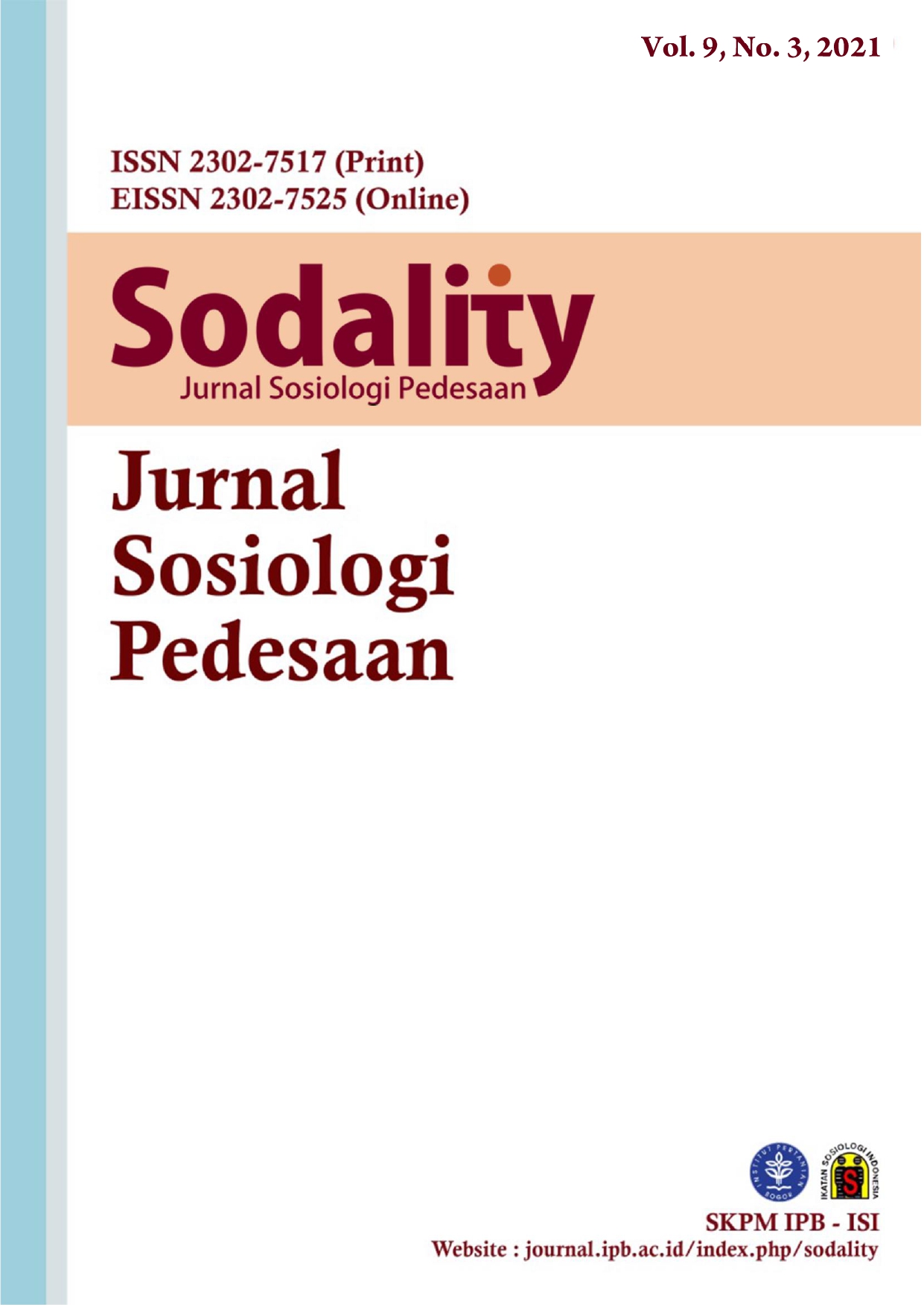Actor Contestation in Village Fund Management
Abstract
Village funds are sourced from the central government budget which is trasferred directly to the village government. This direct transfer takes place after Law No. 6/2014 or also known as The Village Law. This larger village fund can only be accessed by the village government if it follows the rules set by the central government so that the actor in the village will use their assets to accomodate their interests related to village fund management. This study aims to explain the contestation of actors in managing village funds in two villages. This study uses a qualitative method with a case study approach conducted in Suko Village, Probolinggo Regency and Sukadamai Village, Bogor Regency. The results of this study are the village head is the actor who plays the most role in managing village funds using symbolic asset which is the position of the village head. This asset is the strongest because it has legitimacy from the state to be able to make decisions related to the village fund management.
References
Aziz, N. L. L. (2016). Otonomi Desa dan Efektivitas Dana Desa. Jurnal Penelitian Politik, 13, 193–211. https://doi.org/10.20885/unisia.vol27.iss53.art12
Bourdieu, P. (1990). The Logic of Practice. Stanford University Press.
Bourdieu, P. (1995). Outline of A Theory of Practice (Vol. 25, Issue 1). Cambridge University Press. https://doi.org/10.1590/S0103-20702013000100001
Bourdieu, P. (2010). Arena Produksi Kultural sebuah Kajian Sosiologi Budaya. Kreasi Wacana.
BPS. (2019). Jumlah Desa/Kelurahan Menurut Provinsi 2019. https://www.bps.go.id/indikator/indikator/view_data_pub/0000/api_pub/43/da_02/1
Creswell, J. W. (2016). Research Design Qualitative, Quantitative, and Mixed Methods Approaches. SAGE Publications Inc.
Hardianti, S., Muhammad, H., & Lutfi, M. (2017). Partisipasi Masyarakat Dalam Pembangunan Infrastruktur Desa (Program Alokasi Dana Desa Di Desa Buntongi Kecamatan Ampana Kota). Katalogis, 5(1), 120–126.
Iwansyah, Sunito, S., & Syaf, S. (2017). Modal Jaro dalam Arena Politik Lokal : Studi Kasus di Desa Cileuksa Kecamatan Sukajaya Kabupaten Bogor. Jurnal Sosiologi Reflektif, 11(1), 81. https://doi.org/10.14421/jsr.v11i1.1272
Kusuma Putra, C., & Nur Pratiwi, R. (2013). Pengelolaan Alokasi Dana Desa dalam Pemberdayaan Masyarakat Desa (Studi pada Desa Wonorejo Kecamatan Singosari Kabupaten Malang). Jurnal Administrasi Publik, 1(6), 1203–1212. http://administrasipublik.studentjournal.ub.ac.id/index.php/jap/article/view/193
Kusumastuti, A. (2016). Modal Sosial dan Mekanisme Adaptasi Masyarakat Pedesaan dalam Pengelolaan dan Pembangunan Infrastruktur. MASYARAKAT: Jurnal Sosiologi, 20(1). https://doi.org/10.7454/mjs.v20i1.4740
Madea, Y., Laloma, A., & Londa, V. Y. (2017). Peran Kepala Desa Dalam Pengelolaan Dana Desa Di Kecamatan Essang Selatan Kabupaten Kepulauan Talaud. Jurnal Administrasi Publik UNSRAT, 3(046).
Mahmuddin, & Banurea, D. (2018). Pemanfaatan Dana Desa Dalam Pembangunan Desa. Jurnal Ilmiah Mahasiswa FISIP Unsyiah, 3, 14. www.jim.unsyiah.ac.id/FISIP
Mardiyah, S. A., & Nurlinah. (2019). Analisis Peran Badan Permusyawaratan Desa (BPD) Dalam Penyelenggaraan Pemerintahan Di Desa Pao Kecamatan Tombolopao Kabupaten Gowa. Jurnal Ilmu Pemerintahan, 12(2), 108–115.
Maumeha, M. E., Liando, D., & Kairupan, J. (2017). Kinerja Pemerintah Dalam Pengelolaan Alokasi Dana Desa (Suatu Studi Di Desa Dokulamo Kecamatan Galela Barat). Jurnal Eksekutif, 1(1).
Miles, M. B., & Huberman, M. (1992). Analisis Data Kualitatif. UI Press.
Ngarsiningtyas, S. K., & Sembiring, W. M. (2016). Peran Badan Permusyawaratan Desa Dalam Penyusunan Dan Penetapan Peraturan Desa. Jurnal Imu Pemerintahan Dan Sosial Politik UMA, 4(2), 161–175. https://doi.org/10.32493/jpkn.v5i1.y2018.p61-84
Ridha, F. (2019). Analisis Pengelolaan Dana Desa dalam Meningkatkan Perekonomian Masyarakat di Kecamatan Langsa Kota Kota Langsa. AT-TAWASSUTH: Jurnal Ekonomi Islam, 4, 252–276. https://doi.org/10.1017/CBO9781107415324.004
Ritzer, G., & Goodman, D. J. (2010). Teori Sosiologi Modern. Kencana.
Ritzer, G., & Smart, B. (2014). Handbook Teori Sosial. Nusa Media.
Saefulrahman, I. (2015). Kepemimpinan, Modal Sosial, dan Pembangunan Desa (Kasus Keberhasilan Pembangunan di Desa Pangauban Kecamatan Cisurupan Kabupaten Garut). Jurnal Ilmu Pemerintahan, 1(1), 149. https://doi.org/10.24198/cosmogov.v1i1.11804
Sampean, Wahyuni, E. S., & Sjaf, S. (2019). The Paradox of Recognition Principles in Village Law in Ammatoa Kajang Indigenous Community. Sodality: Jurnal Sosiologi Pedesaan, 7(3), 195–211. https://doi.org/10.22500/sodality.v7i3.28630
Shohibuddin, M. (2016). Peluang dan Tantangan Undang-undang Desa dalam Upaya Demokratisasi Tata Kelola Sumber Daya Alam Desa: Perspektif Agraria Kritis. MASYARAKAT: Jurnal Sosiologi, 21(1), 1–33. https://doi.org/10.7454/mjs.v21i1.5021
Sjaf, S. (2014). Politik Etnik : Dinamika Politik Lokal Di Kendari. Yayasan Pustaka Obor Indonesia.
Sjaf, S. (2019). Involusi Republik Merdesa. PT Penerbit IPB Press.
Sofiyanto, M., Mardani, R. M., & Salim, M. G. (2017). Pengelolaan Dana Desa Dalam Upaya Meningkatkan Pembangunan Di Desa Banyuates Kecamatan Banyuates Kabupaten Sampang. Jurnal Riset Manajemen, November 2016, 124–135. http://riset.unisma.ac.id/index.php/jrm/issue/view/85
Wibisono, N., & Purnomo, H. (2017). Mengungkap Fenomena Pengawasan Publik terhadap Dana Desa di Kabupaten Madiun. Jurnal AKSI (Akuntansi Dan Sistem Informasi), 2(1), 8–19.
Authors who publish with this journal agree to the following terms:
- Authors retain copyright and grant the journal right of first publication with the work simultaneously licensed under a

This work is licensed under a Creative Commons Attribution 4.0 International License. that allows others to share the work with an acknowledgement of the work's authorship and initial publication in this journal. - Authors are able to enter into separate, additional contractual arrangements for the non-exclusive distribution of the journal's published version of the work (e.g., post it to an institutional repository or publish it in a book), with an acknowledgement of its initial publication in this journal.
- Authors are permitted and encouraged to post their work online (e.g., in institutional repositories or on their website) prior to and during the submission process, as it can lead to productive exchanges, as well as earlier and greater citation of published work (See The Effect of Open Access).





.png)









